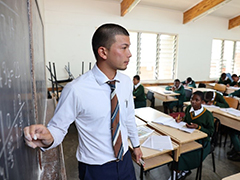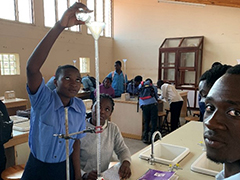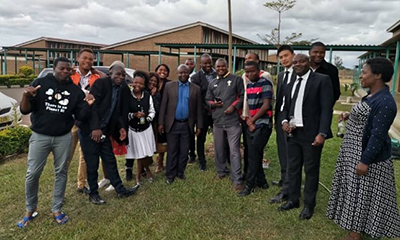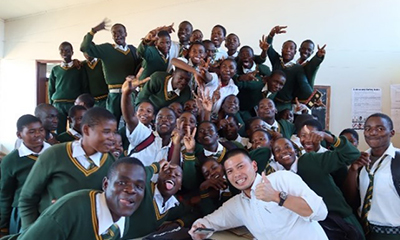Volunteer Report. "Days in Malawi"
2023.06.05
Name: Hodaka Yajima
Specialty: Science Education
I work at a secondary school on the outskirts of the capital of Malawi, known as Nalikule Secondary School. The school consists of two sections: Day Learning and Open Distance Learning. Day Learning runs from 7.30am to 2pm, while Open Distance Learning runs from 2pm to 5pm. Each class session lasts 40 minutes and there are generally no breaks between class sessions, with 20-minute breaks at around 10:00 and 12:00 for Day Learning. But there are no breaks between class sessions in Open Distance Learning. There are four grades with two classes each of about 40 students. I teach in third grade chemistry and second grade mathematics in both Day and Open Distance section.
My day starts early in the morning. I leave home every morning at 6.30am and take the school bus that comes near my house. The bus picks up other staff as well who live far away from the school and as such I arrive at school around 8am. After arriving at my school, I teach about five classes a day in English to Day Learning students. In my spare time, I prepare for classes, check homework, mark papers during test periods and clean up the science lab to improve the environment. Day Learning classes finishes at around 14:00 and at the same time, Open Distance Learning begins. In my free time during Open Distance Learning classes, I hold lessons for martial arts club, science club and supplementary classes once a week for an hour each. After Open Distance Learning classes, I take the school bus and return home at around 6.30pm.
My day mainly consists of teaching classes at the place of assignment and teaching martial arts as one way of introducing Japan. I also assist science club to show the enjoyment of science and supplementary classes to improve student's academic skills.

The content of mathematics taught is a little shallow than in Japan, however generally it is the same content studied in Japanese junior high schools, such as quadratic functions, linear equations and simple probability in the second year of secondary school in Malawi, which corresponds, with content for the first year of high school in Japan. On the other hand, chemistry, such as quantity of matter, chemical bonding and organic chemistry, is almost identical to what students study in Japanese high schools.
The impression I have is that Malawian students are no different from Japanese students. Students who are good at studying will study in the library after school or ask questions if they don't understand a problem. Conversely, students who are not good at studying may play football on the ground after tests, even during test week, or read books which aren't related with the subject during class time. However, all students are kind and most of them come to help me when I am carrying textbooks or laboratory equipment to the class. On the other hand, problems of low students' academic achievement and school attendance due to differences in economic conditions are more serious in Malawi than in Japan. It is common for students to fail to come to school due to economic and academic problems, or even marriage problems. It's not all pupil that have textbooks for all subjects. Some pupils have torn uniforms or do not have enough writing materials. However, it is common to see students borrowing textbooks from the library, not worrying about each other's torn uniforms, or cooperating with each other to solve problems, such as lending each other writing materials even during tests. I feel that it is one of the good points of this country that everyone is tolerant and helps each other even in the field of education.

Teachers participate in in-school training for science and mathematics teacher training just as they do in Japan with the aim of improving their own teaching skills. When I observe local teachers in their classes, I see students enjoying their studies. And I learn a lot from their efforts to increase interest.
My activities in Malawi will clock one year and ten months in June. I guess, I have made a tiny improvement to my school in the period, but the teachers and students helped me a lot. I really appreciate Malawians who have treated me a Japanese in their school warmly. Some teachers and students know about Japan and they even tell me "I love Japan and Japanese people". This is a legacy of Japanese who have worked in Malawi and made good relations with Malawians. Because of their efforts, I have worked with passion in this country. Although I only have a short time left, I would like to express my gratitude to all the people who have supported and assisted my stay in Malawi. Finally, with all the hospitality showed to me, I promise to repay back by sharing with others the beauty of Malawi I have experienced for their benefit.


scroll